Saturday, May 27, 2006
2nd sem result
Monday, May 22, 2006
key chain....

My MBA classmate (Meena) happened to help out her friend who is involved in a charity work by selling key chains to her MBA batchmates :). Once I looked at the different types of key chains, could not resist the temptation of buying one. Impulse purchase in terms of marketing lingo.
Thought to post a pic on the blog before it becomes history :))
Sunday, May 21, 2006
EHM
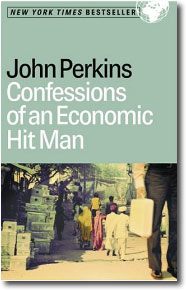
Autor: John Perkins
I would have to say this is one of the most mesmerizing books I have ever read. It describes account of the hidden agendas of US of creating a global empire . In gist is selecting target countries , then convincing them to take huge loans financed by World Bank & IMF, convincing governments of inflated economic growths and making them indebted so that they are bound to obey and abide by as per US wishes. All construction and engineering activities being outsourced to the big corporations of US.
What's EHM(Economic Hit Men)- Highly paid professionals who cheat countries around the globe out of trillions of dollars. They play a game as old as empire, but one that has taken on new and terrifying dimensions during the time of globalization.
The book describes life of an EHM(author himself) who was part of this deed for long..... he describes about the various propogandas manifested by US to gain control across regions of the world like Saudi Arabia, Panama, Equador, Indonesia, Iran, Iraq which are of strategic importance to US to quench its ever increasing thirst for oil and maintain the constant supply of the same and to promote the weatlhy and rich in US and in the countries targeted at the expense of increasing debts for these countries and making them puppets in the hands of US. If anyone tried to abject to there motives they were simply terminated in coveted operations ...like what happened to Panama's Omar Torrijos, Ecuador's Jaime Roldos and Iran's Dr. Mohammed Mossadegh and recently Iraq's Saddam........
Other Links for book review.... Link 1 , Link 2
Wednesday, May 17, 2006
FLOW....
 FLOW took long to finish off , dozed over many times while reading it but a really enrichning experience for anyone who reads it.
FLOW took long to finish off , dozed over many times while reading it but a really enrichning experience for anyone who reads it.Author:Mihaly Csikszentmihalyi
The book basically deals with positive aspects of human experience -joy, creativity, the process of total involvement with life which the author refers as flow. The book is a result of decades of research by the author and many others and one can feel it while one is growing through it.
Some parts of the book are too complex to understand , though the author has tried his best to make it simple but the subject itself is such that that complexity cant be warded off completely.
Some points which I jotted down while reading:
The function of consciousness is to represent information about what is happening outside and inside the organism in such a way that it can be evaluated and acted upon by the body.
Sometimes the intention of making an ideological statement might override genetic instructions.
Fact:The shortest time for mind to distinguish between 2 sets of bits of information is 1/18 of a second. Or 126 bits of information per second or 7560 per minute or ½ million per hour or 185 billion over a lifetime of 70 years. Attention is that selects the relevant bits of information from the potential millions of bits available.
Pleasure is a feeling of contentment that one achieves whenever information in consciousness says that expectations set by biological programs or by social conditioning have been met.
Pleasure by itself does not bring happiness. Sleep, rest, food and sex provide restorative homeostatic experiences that return consciousness to order after the needs of the body intrude and cause psychic entropy (a disorganization of self that impairs its effectiveness) to occur.
Difference between Pleasure and Enjoyment
Enjoyment event occurs when the person has not only met some prior expectation or satisfied a need or a desire but also gone beyond what he or she has been programmed to do and achieved something unexpected, perhaps something even unimagined before. Enjoyment is characterized by this forward movement: by a sense of novelty, of accomplishment.
The challenges of competition can be stimulating and enjoyable. But when beating the opponent takes precedence in the mind over performing as well as possible, enjoyment tends to disappear. Competition is enjoyable only when it is a means to perfect ones skills; when it becomes and end in itself, it ceases to be fun.
Enjoyment occurs at the boundary between boredom and anxiety.
Autotelic--- An activity done not with the expectation of some future benefit, but simply because the doing itself is the reward. I mostly feel autotelic while playing.
The car thefts , vandalism is motivated by the need to have a flow experiences not available in ordinary life. Violence and crime will attract those who cannot find their way to more complex autotelic experiences.
Optimal experience: a sense that ones skill are adequate to cope with the challenges at hand, in a goal directed, rule bound action system that provide clear clues as to how well one is performing. Concentration is so intense that there is no attention left over to think about anything irrelevant, or to worry about problems. Self consciousness disappears, and sense of time becomes distorted.
Roger Caillois , the French psychological anthropologist’s division of games into 4 classes:
1. Agon – games that have competition as their main feature
2. Alea – includes all games of chance, from dice to bingo
3. Ilinx – activities that alter consciousness by scrambling ordinary perception eg. Riding a merry-go- round.
4. Mimicry – group of activities in which alternative realities are created, such as dance, theater.
 To illustrate with an example A1 state is a boy learning to play tennis by hitting ball over the net….. as time passes it will either be boring and reach state A2 or if another opponent is must stronger than the boy it will lead to anxiety state A3….. in order to improve on and reach back the state of flow, he needs to set a new and difficult goal that matches his skills- for example in case of A2 to beat an opponent just a little more advanced than he is…he would be back in flow state at A4, In case of state A3 the way back to flow requires he increase his skills.
To illustrate with an example A1 state is a boy learning to play tennis by hitting ball over the net….. as time passes it will either be boring and reach state A2 or if another opponent is must stronger than the boy it will lead to anxiety state A3….. in order to improve on and reach back the state of flow, he needs to set a new and difficult goal that matches his skills- for example in case of A2 to beat an opponent just a little more advanced than he is…he would be back in flow state at A4, In case of state A3 the way back to flow requires he increase his skills.
Both A1 and A4 are in flow state but A4 is more complex experience than A1 because it involves greater challenges and demands greater skills from the player.
Important: Now A4 does not represent a stable situation either. As the player keeps playing, either he becomes bored by stale opportunities at that level or he will become anxious and frustrated by relatively low ability. So the motivation to enjoy himself again will push him to get back to flow state higher than complexity of A4.
Sexuality is one of the most universally rewarding experiences, surpassed in its power to motivate perhaps only by the need to survive, to drink and to eat. The urge to have sex is so powerful that it can drain psychic energy away from other necessary goals. Therefore every culture has to invest great efforts in rechanneling and restraining it, and many complex social institutions exist only in order to regulate this urge. At first it is very easy to obtain pleasure from sex, and even to enjoy it. The first date, first kiss, the first intercourse all present heady new challenges that keep the young person in flow for weeks on end. Initially physical challenges alone are enough to sustain flow, but unless romance and genuine care also develop, the relationship will grow stale.
Writing gives the mind a disciplined means of expression. It allows one to record events and experiences so that they can be easily recalled and relieved in the future. It is a way to analyze and understand experiences, a self communication that brings order to them.
Having a record of the past can make a great contribution to the quality of life. If frees us from the tyranny of the present, and makes it possible for consciousness to revisit former times.
People experience more flow situations at work than in leisure.
Paradox: On the job people feel skillful and challenged, and therefore feel more happy, strong, creative and satisfied. In their free time people feel that there is generally not much to do and their skills are not being used, and therefore they tend to feel more sad, weak, dull and dissatisfied. Yet they would like to work less and spend more time in leisure.
One possible explanation----when it comes to work, people do not heed the evidence of their senses. They disregard the quality of immediate experience , and base their motivation instead on strongly rooted cultural stereotype of what work is supposed to be like. They think of it as an imposition , a constraint , an infringement of their freedom, and therefore something to be avoided as much as possible.
Jobs are easier to enjoy than free time, because they have built in goals, feedback, rules and challenges, all of which encourage one to become involved in one’s work, to concentrate and lose oneself into it. Free time on the other hand , is unstructured, and requires much greater effort to be shaped into something that can be enjoyed.
Worries about one’s love life, health, investments, family and job are always hovering at the periphery of attention, waiting until there is nothing pressing that demands the concentration. As soon as the mind is ready to relax, ZAP! The potential problems that were waiting in the wings take over.
Friendship allows us to express parts of our beings that we seldom have the opportunity to act out otherwise.
2 types of skills:
*Instrumental---- the ones which we learn so that we can effectively cope with the environment. eg. reading, writing
*Expressive---- refer to actions that attempt to externalize our subjective experiences. Eg telling a joke we like, painting a picture that represents our feelings.
A true friend is someone we can occasionally be crazy with, someone who does not expect us to be always true to form.Family primarily provides emotional protection while friendship usually involves mysterious novelty.
Why are some people weakened by stress , while others gain strength from it ?
Three main steps that seemed to be involved in transforming a hopeless situation into a new flow activity that can be controlled.
1. Unselfconscious self assurance
The implicit belief that ones destiny is in ones hand. Not doubting that own resources would be sufficient to determine fate and at the same time absence of ego.
2. Focusing attention on the world
Attention on surroundings and constantly processing information from it.
3. The discovery of new solutions
The autotelic self is the one that easily translates potential threats into enjoyable challenges, and therefore maintains its inner harmony. The rules for developing such a self are simple .
i)Setting goals-clear goals to strive for
ii)Becoming immersed in the activity
iii)Paying attention to what is happening
iv)Learning to enjoy immediate experience
To be able to transform random events into flow, one must develop skills that stretch capacities, that make one become more than what one is.
I know you might find my writing highly unstructured and not in continuum ...(hope to improve upon it )...... so here is an alternative link summarizing the book.
A must read for everyone :)
Monday, May 15, 2006
Trip to Malacca.....13thMay 2006
Malacca on the map

On way to Malacca --(from left)back Pramod, Autee and Gags, in front Abhinav and myself.
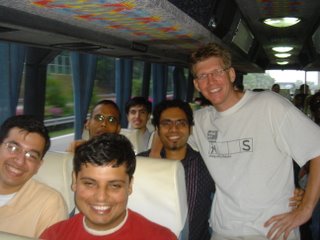
One of the government buildings of sumatran architecture.  View at the golf resort where we had our lunch just after entering Malacca
View at the golf resort where we had our lunch just after entering Malacca Police Station
Police Station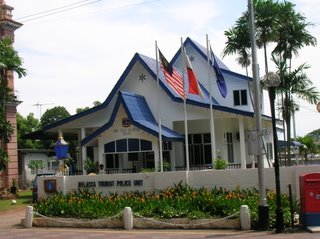 The Christ Church at the Dutch square
The Christ Church at the Dutch square  from front Shams, Abhinav, myself, Yunmee, Meena and Toddi(Rahul).
from front Shams, Abhinav, myself, Yunmee, Meena and Toddi(Rahul). 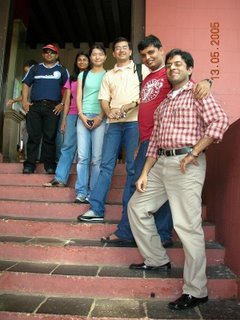 Along the narrow streets in bus.....
Along the narrow streets in bus..... 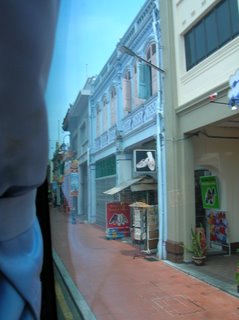
Group @ A' Famosa...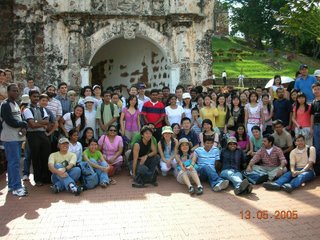 View from top....
View from top....
enjoyed the trip......
Monday, May 08, 2006
Enjoyed first week of May...
 Mac Ritchie Reservoir ----3rd May
Mac Ritchie Reservoir ----3rd May
Botanic Gardens ----4th May

( National Flower of Singapore)

(live band performances venue)
 Nanyang Technological University -----5th May
Nanyang Technological University -----5th May
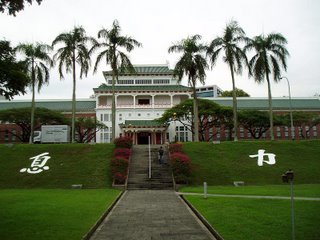


Monday, May 01, 2006
Attraction.........
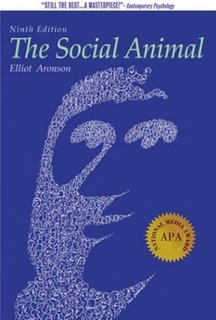
After finishing of with COLLATERAL LANGUAGE... i tried reading THE ART OF BEING by Erich Fromm.... too heavy stuff.. still i managed to turn around 20-30 pages which looked interesting..... but finally gave up as I felt I should start with something more easier to understand in psychology.... so got hold of THE SOCIAL ANIMAL by Elliot Aronson. The book is generally referred by undergraduate students of psychology but after reading a bit I felt that the writer has done a brilliant job of communicating his ideas in most simple and effetive way through the use of various examples which one can easily decipher.
Rather than starting of from beginning I preferred this time to read the chapter which looked very interesting.... ATTRACTION: Why People Like Each Other.......
The author gives various aspects of liking others. We like people whose behavior provides us with maximum reward at minimum cost. But it cannot explain all. Disagreement that leads to improvement may carry its own rewards. Flattery will get you somewhere to some extend in being liked but not far. We like people who contribute to our victory more than those who do not- even if they had no intention of doing us a favor.
We like to be liked- and the more insecure we feel, the more we like someone who likes us. A person who feels insecure may even seek out a less attractive person in order to diminish the possibility of being rejected.
Our being liked by a person increases the likelihood we will like him or her.
Strange fact:
Similarity of thoughts and being liked are not additive. Experiments show that although it is nice to be liked by someone who shares our values and opinions, it is far more exciting to be liked by someone who dosen’t. This happens because we infer there must be something special and unique about us that the other person finds attractive. People tend to suspect that, where opinions differ, "That person likes me for myself---not for my opinions." Because this realization is quite gratifying, we tend to like the individual more.
Increases in positive, rewarding behavior from another person have more impact on an individual than constant, invariant reward from that person.
My thoughts:
A hypothetical scenario, what if the +ve first increases then decreases(--graph1 in pic below)…. u get into more closely when the positive increases… but gradually figure out that now its turning into downhill which never seems to go up again…??
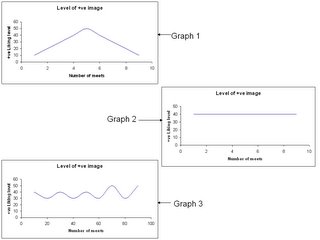
A relationship in which close friends are the ones least likely to provide us with gains in esteem is almost certain to be a relationship in which the partner are not open and honest with each other. In a closed relationship, people tend to suppress their annoyances and keep their negative feelings to themselves. This results in a fragile plateau that appears stable and positive but that can be devastated by sudden shift in sentiment. In an open, honest, authentic relationship, one in which people are able to share their true feelings and impressions (even their negative ones) -- graph 3--, no such plateau is reached. Rather there is continuous zigzagging of sentiment around the point of relatively high esteem.
We like a person better after we have disclosed something important about ourselves. We also like a person better when they honor us by revealing something intimate and negative about themselves; this is specially true when the person is ordinarily reserved and, therefore, the behavior implies that there is something special about us that made him/her like opening up.
First impressions are important, relationships must begin before they can develop and mature. But as the relationship ripens towards greater intimacy, what becomes increasingly important is authenticity- our ability to give up trying to make a good impression and begin to reveal things about ourselves that are honest even if unsavory. We must be willing to communicate a wide range of feelings to our friends under appropriate circumstances and in ways that reflect our caring.
My thoughts----- As religions across the world are different and there are different beliefs of various cultures, depending on the culture we are brought up shapes our thinking and is predominantly shown in our behavior with others. Does research carried out in one part of the world apply universally to every other geographic location?? I doubt this…. Though I guess most of the findings may still be valid but some might vary.....
Would update more as I read further......:)